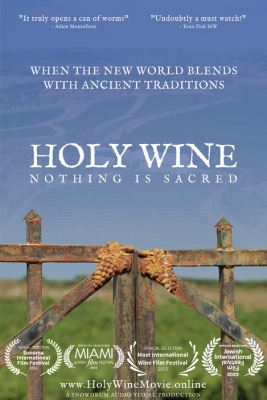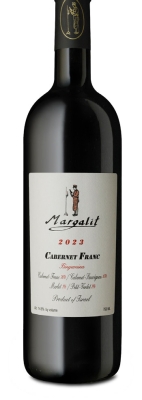The Martin Sinkoff Wine Interview With Snow R. Shai
Snow Shai is an Israeli original. Educator, professor, filmmaker, intellectual and wine lover. His film "Holy Wine", which he wrote and produced and directed is, to my knowledge, the best film about Israeli wine today. And, wine aside, it is an excellent compelling film. It asks hard questions and brings the viewer directly into the cellars and vineyards of leading producers who answer them. I sat down with Snow to learn more about him and the film.
Where did you grow up?
Tel Aviv, born and raised.
Where did you go to school and what did you study?
I started working in the media industry early and learned by gaining real-world experience. Once I was released from the army, I started working full-time. This experience gained me the privilege of going to school to teach filmmaking for the past 20 years at various academic institutions. I'm an autodidact by nature.
How and when did you become interested in film?
As a kid, I loved going to the movies. The movies challenged my imagination, taught me about life and took me to far-away galaxies. The mix of surreal stories, music, sound, and moving pictures, blended together on the silver screen, made a profound impact on me.
When did you become interested in wine?
Growing up, wine was only served on special occasions. But I discovered wine during a family celebration dinner in a fancy chef restaurant in Tel Aviv, late 2004. For some awkward reason, no wine was ordered at the table. My wife and I were surprised so we ordered the two wines on the menu offered by the glass. It was our revelation moment: we were stunned by the elegance, complexity and flavor of these two wines. One of them was an Israeli wine and immediately sparked my curiosity about our local wine industry It was a 2003 Clos de Gat "Ayalon Valley" red wine. I started to explore and drink Israeli wine, and wines from around the world. I became intensely curious to learn more about wine. I was hooked!
What do you think about Israeli wine today?
Israeli wine today is an amazing reflection of what our country has become and what we have achieved in our short years of existence. It's remarkable. In the "wild east", winemaking rules are broken, bent and rewritten, in search of Israel's character and identity. Israel wine is so diverse and eclectic, ever changing, inventive, and blends the old with the new. It's fascinating. It's also delicious. Israel wine has evolved greatly, but we are still at the beginning. We have a bright future. Unfortunately, some "rules" remain untouchable and continue to divide us, keeping winemakers away from their craft.
Your film, "Holy Wine", raises many questions about whether or not Israeli wines should be kosher. What are your thoughts about this issue?
Almost all wine which is naturally made around the world, is "kosher". Wine is just fermented grapes. There is nothing else in there. Most winemaking kosher laws are similar to any winemaking process, like harvesting the vine when it's four years old or not inserting anything other than grapes in the wine. Other rules are of biblical nature and hardly anyone truly follows them, such as skipping a harvest every seventh year and tithing. The most important rule left and the one many have an issue with, is that a sabbath observant Jew needs to make the wine. Being Jewish is not good enough. You need to see that he is observant by showing a religious trait, such as kippa. This rule is fairly new and reveals the notion that the religious kosher supervision bodies, such as the Head Rabbinate or other local rabbinical organizations, have claimed ownership of who is Jewish and now control the winemaking workforce and supervision.
I don't think kosher laws reflect the values of a liberal, advanced, human rights-driven state.
As I learned about the ancient, rich history and traditions of our wine heritage and culture, I've come to appreciate how we have progressed. The outstanding rigorous work of talented pioneer winemakers, dreamers, and insatiable entrepreneurship has made Israeli wine what it is today. Yet all this magnificent talent, this undeniable quest for quality, knowledge and identity, is tightly controlled by draconian, religious and outdated rules, which are interpreted from the same ancient traditions. Some of them are quite new, imposed on the wine industry, due to religious agents that tighten their grip with time. These orthodox kosher winemaking laws became normalized and continue to obstruct the winemaking process while, at the same time, creating winemaking jobs only for the religious and orthodox communities.
Passionate, young Israelis, who study winemaking around the world or in Israel, cannot work in the actual winemaking process of any big winery, which offer the most jobs, unless they are religious. They can make wine in small boutique non-kosher wineries, but those are usually struggling and offer few job offers. This is preposterous and quenches passion! Is this what makes the wine so holy? I think kosher laws must change. I believe it can be done. Traditions that do not change will die.
Why did you choose not to interview wine-loving rabbis or others who understand and believe in Kosher certification?
Interviewing an authoritative rabbi was in the script, but I decided to refrain from showing orthodox Jews on camera, while supporting actions that feel unjust and misguided to me. It is a thin line to walk. Some religious voices that I approached did not want to go on record. Having said that, the film does offer quite a few answers, by the winemakers themselves and other wine experts interviewed in the film, on why they did or did not become kosher.
Which wine did you select to describe for us?
My all-time favorite Israel wine is the 2008 Margalit Cabernet Franc. It offers a unique profile by blending deliciously complex fruit, which feels opulent and elegant, yet grounded and opposed by a freshly green acidic tone. It's a triumph of a balancing act, thirst quenching and delicious, which is the most important aspect of wine. Naturally, I have had many vintages since then, and it is fairly consistent, which says a lot. This wine is an ongoing and outstanding pleasure to drink with good food, family, and friends, no matter their conviction. Isn't that what it's all about?
Martin Sinkoff's tasting notes
Margalit Cabernet Franc 2023
The 2008 vintage that Snow tasted is no longer available commercially, so we selected the currently available 2023. The wine is a revelation. Complex, powerful, rich with a long aftertaste (a mark of high quality in wine). The wine is a "Bordeaux blend": 76% Cabernet Franc, 15% Cabernet Sauvignon, 7% Merlot and 2% Petit-Verdot. When I tasted the wine with Shai, I remarked that in a blind tasting (a tasting where the label is masked) the wine would easily be confused with a great Bordeaux, confirming the high-quality of Israeli wine making today.
Links to the Holy Wine film
Holy Wine website & trailer: www.HolyWineMovie.online
Instagram: @snowdrum
Facebook: Holy Wine Movie










Comments